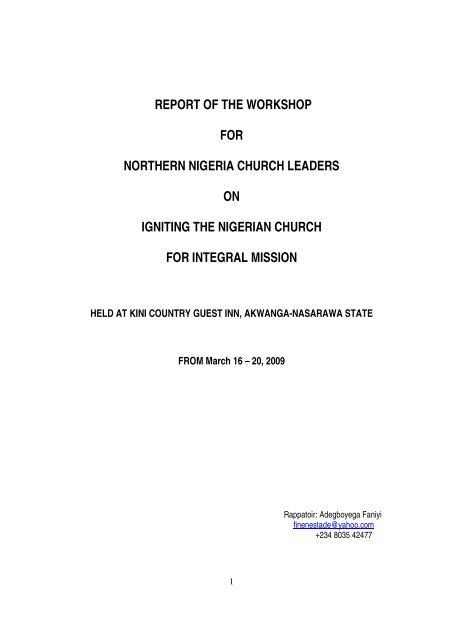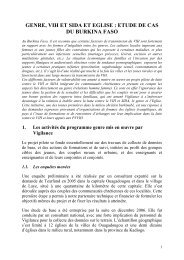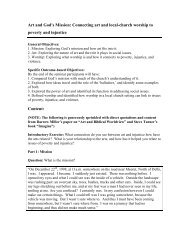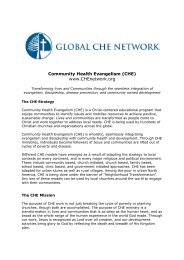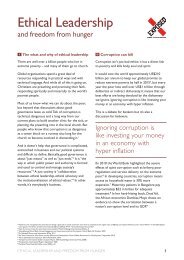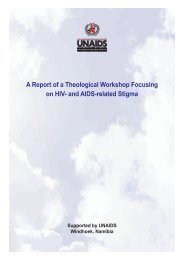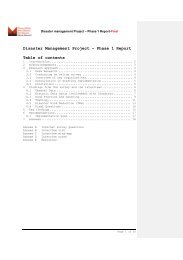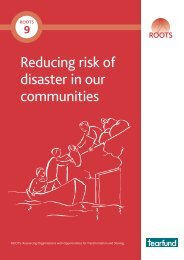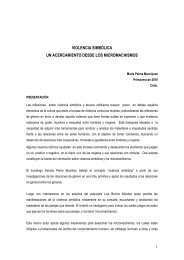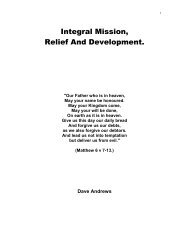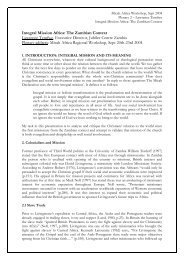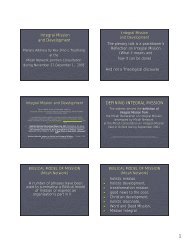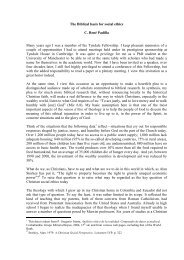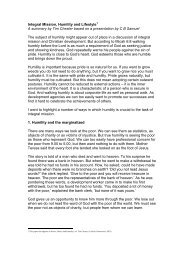Nigeria National Conversation, 2009 - Micah Network
Nigeria National Conversation, 2009 - Micah Network
Nigeria National Conversation, 2009 - Micah Network
You also want an ePaper? Increase the reach of your titles
YUMPU automatically turns print PDFs into web optimized ePapers that Google loves.
REPORT OF THE WORKSHOPFORNORTHERN NIGERIA CHURCH LEADERSONIGNITING THE NIGERIAN CHURCHFOR INTEGRAL MISSIONHELD AT KINI COUNTRY GUEST INN, AKWANGA-NASARAWA STATEFROM March 16 – 20, <strong>2009</strong>Rappatoir: Adegboyega Faniyifinenestade@yahoo.com+234 8035 424771
ContentsINTRODUCTION ................................................................................................................................................ 31.0 CLIMATE SETTING: .................................................................................................................................... 42.0 INTRODUCTION TO TEARFUND STRATEGY ........................................................................................... 53.0 MICAH NETWORK ...................................................................................................................................... 74.0 MICAH CHALLENGE NIGERIA - Mobilizing Christians against Poverty ..................................................... 85.0 UNDERSTANDING POVERTY ................................................................................................................... 96.0 THEOLOGY OF INTEGRAL MISSION ...................................................................................................... 107.0 UNDERSTANDING THE LOCAL CHURCH .............................................................................................. 138.0 LEADERSHIP IN THE CHURCH ............................................................................................................... 149.0 THE CHURCH AND DISASTER ................................................................................................................ 1710.0 ENVISIONING THE LOCAL CHURCH .................................................................................................... 1811.0 ENVISIONING CHURCH AND COMMUNITY MOBILISATION ............................................................... 2012.0 RELATIONSHIP BUILDING..................................................................................................................... 2213.0 CASE STUDIES OF ZIMBABWE ORPHANS THROUGH EXTENDED HANDS (ZOE, ZIMBABWE) ..... 2314.0 ACTION PLAN ......................................................................................................................................... 2515.0 WORKSHOP EVALUATION .................................................................................................................... 2516.0 WORKSHOP CLOSING REMARKS ........................................................................................................ 26ANNEX 1: NAMES OF WORKSHOP PARTICIPANTS ................................................................................... 272
INTRODUCTIONThe first key to unlocking the vision of Tearfund is igniting the global church for integral mission. This involvesworking with and through existing partners, an expanded <strong>Micah</strong> <strong>Network</strong> of Christian agencies, churches andtheological colleges. The focus is outworking integral mission through the local church.As the implementation of the Tearfund strategy for <strong>Nigeria</strong> has commenced, consideration must be given onhow this key would be applied in the context of <strong>Nigeria</strong>. Many church denominations are involved in integralmission in <strong>Nigeria</strong> but not through the local church. In <strong>Nigeria</strong>, this is a new concept. There are many otherchurches especially the Pentecostal churches that are not involved in integral mission. These need to beenvisioned for integral mission through the local church. The strategy for meeting these needs involve a seriesof seminars and workshops to church leaders. CRUDAN and RURCON are the main consultants to carry outthe project of igniting the church for Integral Mission.Consequently a 3-day seminar on Integral Mission was organized by CRUDAN & RURCON for church leadersfrom the northern <strong>Nigeria</strong> as part of the project of “Igniting the <strong>Nigeria</strong> Church for Integral Mission” with supportfrom <strong>Micah</strong> <strong>Network</strong> and Tearfund. The workshop had 24 key church leaders in attendance from differentChristian denominations. The workshop was held at Kini Guest Inn, Akwanga Nasarawa State from 16 th -20 thMarch <strong>2009</strong>. The workshop was facilitated by: Mr. Andrew Gwaivangmin and Mr. Daniel Makpu and supportedby Mr. Danladi Musa.The workshop was aimed at exposing participants to Integral Mission and Building Relationship amongparticipants.TOPICS COVERED:• Introduction to Tearfund Strategy• MICAH NETWORK• Understanding Poverty• Theology of Integral Mission• Understanding the local Church• Leadership in the Church• The Church and Disaster• Envisioning the Local Church• Envisioning Church and Community• Relationship Building• Case Studies of Zimbabwe Orphans (ZOE, Zimbabwe)Action plans were developed by each participant indicating what they would be doing after the workshop.3
DAY ONE (1)Facilitator: Daniel K MakpuDevotion: By Rev Dr. Pandang YamsatThe devotion commenced with singing of choruses, which was followed by a word of prayer. The speakercommenced by reading from the book of Hebrews 13:20-22. He appreciated God for the opportunity given tothem to attend this workshop. Most times we are struggling in order to make it in life as if we have no hope.Sometimes we need to ask the rich people in our churches whether they have life. Most of us think that havingmaterial possession is life. Having life is a wholistic thing which encompasses every abundant need. It is Godthat gives life abundantly, and it is in this life that we have been called to ignite the church for integral mission.Why do we pursue this life, is it God’s will or to satisfy our ego? God’s will for us is to know Him. Christiansmust play their parts to influence, affect and impart the system of the world. It is when we have played ourparts to the fullest that we will enjoy heaven. Play your role as Christians and God will see us through, Amen.A word of prayer was said after the exaltation.1.0 CLIMATE SETTING:A. Self IntroductionEach participant was asked to introduce himself, using the format below; Name: Geo-political zone Church(See details of each participant in the Annex attached)B. Workshop Objectives To know ourselves; To get expose to CRUDAN, RURCON and TEARFUND Introduce participants to Tearfund <strong>Nigeria</strong> strategy Introduce to Igniting the <strong>Nigeria</strong> church Expose participants to CCMPC. Can Evangelical Blocks CCN TEKAN NEMA/NEF PFN Theology Institutions.D. Workshop Expectations (Hopes)The following are participants’ expectations of the workshop: How to be effective and efficient; To know what integral mission means; How to mobilize believers in sponsoring projects; <strong>Network</strong>ing among churches; Gain more insight into integral mission; To know the strategies to use in mobilizing the church; To know more about wholistic development;4
To learn something new;To have more knowledge on the way forward;How Tearfund will partner with <strong>Nigeria</strong> churches;To be trained on how to make the church invest for integral mission;To learn more about Christian approach to social problems.E. Workshop FearsThe fears expressed by participants include: It may be impossible to achieve all the expectations; How will true networking be possible in our <strong>Nigeria</strong> situation? Will I be able to deliver? It might be like most seminars without specific objectives; Have the knowledge and not be able to apply it; Churches ideology on things that are not spiritual; Not to misinterpret the word of God; How the whole process can be advanced; Funds to carry-out the assignment; Sustainability of the project.F. Ground Rules Keep to time; All phones on vibration; Be orderly in talking; Respect other peoples’ opinion.Participants were exposed to CRUDAN’s activities and the relationship between CRUDAN and Tearfund.Copies of handbills on information about CRUDAN were circulated among participants.2.0 INTRODUCTION TO TEARFUND STRATEGY(By Danladi Musa, Tearfund UK <strong>Nigeria</strong> Country Representative)Tearfund is a Christian international non-governmental relief organization based in the UK.Tearfund Corporate Vision:By 2016, we want to see 50 million people released from material and spiritual poverty through aworldwide network of 100,000 local churchesThe keys for unlocking the vision: Igniting the global church for integral mission Transforming local communities. Investing in inspired individuals Speaking out in advocacy Preparing for and responding to disasters Raising support for Tearfund5
The kind of organisation Tearfund wants to be: Christ centred Agile Courageous Highly effective Servant heartedTearfund <strong>Nigeria</strong> Focus Areas:HIV AIDS Response Facilitate local churches to use Integral Mission approaches to mobilise their local communities tounderstand issues associated with HIV and AIDS and their vulnerabilities, and to implement their ownresponses Facilitate young people in schools to understand issues associated with HIV and AIDS and toimplement their own responses Use advocacy to influence local and national policy makers on issues directly relating to partners’projects Facilitate discussion on attitudes towards HIV and AIDS in the church, including on condoms, gender,sex, learning styles and discrimination.Integrated Poverty Reduction Facilitate local churches to use Integral Mission approaches to mobilise their local communities toidentify their own development needs and vulnerabilities, and to implement their own responses. Use advocacy to influence local and national policy makers on issues directly relating to the individualprojects. Promotion of primary education will include:- Advocacy to ensure that Government or Civil Society provides education inputs to targetcommunities.- Funding of low-cost refresher training for existing teachers within target communities.Governance ResponseFacilitate church denominations and local churches to understand governance and democracy issues andto implement their own responsesThe Tearfund Programme Strategy for <strong>Nigeria</strong>, developed at the consultative workshop, identified 3discrete programme components. These components were developed in order to allow the strategy tomaintain a tight focus, thereby allowing financial and capacity development support to be maximised tobring about potential impact. In developing the programme components three criteria were used to allowfocus: Geographical – the geographical areas containing the poorest or most vulnerable people Beneficiary – the beneficiaries who are the poorest or most vulnerable people Sector – the poverty issue which has the greatest impact on the poor6
How will igniting the <strong>Nigeria</strong> church be done?Tearfund identified 10 champions that have assisted in developing the plan.1. Goals A transformed society base on Christian value; Awareness created in at least 1 theological institution on integral mission; 30 denominational leaders positioned and empowered for integral mission; At least 4 main church groupings having at least 2 of their local churches practicing integralmission2. Management of the ProjectThe project is to be managed by 3 champions and 2 consultants/facilitators. The project developed bythe two consultants CRUDAN and RURCON respectively.3. Roles of Champions Inspiring and envisioning other church leaders for integral mission. Initiating and stimulating discussion on integral mission whenever church leaders meet. Serve as motivational speakers on integral mission. Assisting in organizing zonal meetings, theological institution. Assist in raising funds for activities and projects in their geo-political zones.3.0 MICAH NETWORK(By Danladi Musa, Tearfund UK <strong>Nigeria</strong> Country Representative)About <strong>Micah</strong> <strong>Network</strong>The <strong>Micah</strong> <strong>Network</strong> is a group of about 460 Christian relief, development and justice organisations, from75 countries.<strong>Micah</strong> <strong>Network</strong> was formed in 1999, with the following 3 aims: Strengthening the capacity of participating agencies to make a biblically-shaped response to theneeds of the poor and oppressed Speaking strongly and effectively regarding the nature of the mission of the Church to proclaim anddemonstrate the love of Christ to a world in need Prophetically calling upon and influencing the leaders and decision-makers of societies to “maintainthe rights of the poor and oppressed and rescue the weak and needy”.How to join <strong>Micah</strong> <strong>Network</strong>?<strong>Micah</strong> <strong>Network</strong> membership is open to agencies and churches who: work significantly in relief, development and justice ministries are committed to integral mission are interested in working in and through the local church are committed to the aims of the network and desire to participate endorse and affirm the <strong>Micah</strong> <strong>Network</strong> statement of beliefs (see attached).7
Associate membership is open to individuals, networks, theological colleges and other organisations whowish to support the <strong>Micah</strong> <strong>Network</strong>.Membership or associate membership of the <strong>Micah</strong> <strong>Network</strong> can be done by completing the on-line formon the <strong>Micah</strong> <strong>Network</strong> website.Capacity building events<strong>Micah</strong> <strong>Network</strong> has held a number of regional and global workshops and consultations for Christian relief,development and justice organisations. These aim to increase capacity of participating agencies in areasof expressed need and provide a forum for exchange of good practice.Regional and Global events have been held in Africa, Asia, South America and Europe. The <strong>Micah</strong><strong>Network</strong>’s first International Consultation, was held in Oxford UK, in 2001, where the Declaration onIntegral Mission which sets out the biblical basis for the MICAH <strong>Network</strong> was developed. Papers from pastevents and details of upcoming events are posted on the <strong>Micah</strong> <strong>Network</strong> website www.micahnetwork.org.Coordination of <strong>Micah</strong> <strong>Network</strong>The guidance and leadership of <strong>Micah</strong> <strong>Network</strong> is provided by a small Co-ordinating Group of individualssupported by their agencies. The coordinating group is supported by an International Coordinator and agrowing team of volunteers who help with translation, website development and other activities.4.0 MICAH CHALLENGE NIGERIA - Mobilizing Christians against Poverty(By Andrew Gwaivangmin)The MICAH Challenge is a global Christian campaign that will raise a prophetic and powerful voice for andwith the poor. It looks both inwards, to deepening Christian commitment to work for and with economicallypoor communities, and outwards, urging leaders of rich and poor nations to fulfil their public promise toachieve the Millennium Development Goals (MDGs), and so halve absolute global poverty by 2015.Millennium Development Goals (MDGs)All 191 member states of the United Nations, including <strong>Nigeria</strong>, have pledged to achieve the MDGs by2015. These Goals set clear targets for reducing poverty, hunger, disease, illiteracy, environmentaldegradation, and discrimination against women. For each goal a clear set of targets and indicators havebeen defined and will be used to track the progress in meeting the goals.The MDGs provide an exceptional rallying point to work for a more just and compassionate world. We canuse them to help hold our leaders accountable to fulfil the promises they have made.The first phase of the global campaign began at Christmas 2003 with the release of the <strong>Micah</strong> call forglobal sign-on via the <strong>Micah</strong> Challenge website.8
The MICAH callThe <strong>Micah</strong> Call is a call on Christians to commit ourselves, as followers of Jesus, to work together for theholistic transformation of our communities to pursue justice, be passionate about kindness and to walkhumbly with God.A call on international and national decision-makers of both rich and poor nations, to fulfill their publicpromise to achieve the MDGs and so halve absolute global poverty by 2015.A call on Christians everywhere to be agents of hope for and with the poor, and to work with others to holdour national and global leaders accountable in securing a more just and merciful world.What Can YOU Do? Sign the MICAH call Tell others about MICAH Challenge and encourage them to sign the MICAH call Get informed – find out what your church is doing to support individuals and organisations working toreduce poverty Regularly check the <strong>Nigeria</strong>n <strong>National</strong> Campaign page on the MICAH challenge website for eventsand activities and other ways you can work for and with the poor Pray regularly for the success of the campaign and about how you can be involvedThe MICAH Challenge is a global campaign of the World Evangelical Alliance and the <strong>Micah</strong> <strong>Network</strong>, andis offered as a gift to the world Christian community. The World Evangelical Alliance (WEA)(www.worldevangelical.org) was founded in 1951, and now embraces about 3 million local churches in 121countries. As a starting point toward the world God wants, in <strong>Nigeria</strong> the <strong>Micah</strong> Call is supported by overfive organisations with RURCON as the Host Organisation.5.0 UNDERSTANDING POVERTY(By Andrew Gwaivangmin)He began by asking participants to define Poverty. Their responses were: It is people’s inability to meet their needs. It is lack of adequate basic necessities. It is lack of enough resources to adequately meet the basic needs of life. It is lack of basic things for meaningful living. It is lack of physical materials and spiritual needs for a good livelihood.Definition of Poverty: Poverty is powerlessness Poverty is experienced by people who are limited in choices. Economic poverty is limited ability to meet basic needs. Spiritual poverty is limited knowledge of God and of his son Jesus Christ. The underlying cause of poverty is sin, usually committed against those affected by it, and not bythem.9
The Deprivation Trap:Poverty is seen as a lack of assets-households, lands, livestock’s, state of health, etc.This trap talks about poverty in relation to vulnerability, lack of assets, powerlessness, isolation andphysical weakness.6.0 THEOLOGY OF INTEGRAL MISSION(By Andrew Gwaivangmin)This session also looks at what integral mission is and why it is important that the church embraces it. Itbegan with a shared understanding of Integral Mission and closed with this definition; ‘Integral mission’refers to the mission of the church through proclamation and demonstration of the gospel. ‘Proclamation’means telling people the gospel, and is sometimes called evangelism. The term ‘demonstration’ meansshowing people what it means to be part of God’s kingdom, such as through showing love to others. It issometimes called social action or social involvement. The term ‘integral mission’ comes from the Spanish‘mission integral’ and can also be referred to as ‘holistic ministry’, ‘(w)holistic development’, ‘Christiandevelopment’ or ‘transformational development’.The need for the church to be involved in demonstrating the gospelSocial involvement is part of what God expects Christians to do:1. Social involvement is rooted in the character of GodGod is concerned for people’s physical needs. Social involvement is part of his character (for example,see Psalm 146:7-9). He opposes those who are responsible for injustice and sides with the victims ofoppression.God’s character is most fully revealed in the person of Jesus Christ, who showed and preached concernfor the poor (Matthew 4:23; Matthew 9:35-38; Matthew 14:14; Luke 12:33).2. We are called to care for those around usGod expects us to mirror his concern for the oppressed (see Proverbs 31:8-9 and Isaiah 1:10-17). Weare to care for those around us (Mark 12:28-34). Jesus told the parable of the good Samaritan (Luke10:25-37), showing that we are to care for people across social and cultural divides.The links between proclamation and demonstration of the gospelThere is a natural link between demonstration and proclamation: When proclamation leads to repentance by those who respond to the gospel, there are socialimplications. Jesus Christ becomes Lord over every area of their lives, so that there is transformationbeyond the spiritual. In recognition of Christ’s authority and through a desire to please him, Christiansseek to reflect the justice and love of God in their own lifestyle and relationships, and in society as awhole (James 2:15-18). Proclamation therefore leads to social involvement. This social involvement (demonstration), in turn, has consequences for proclamation as Christiansbear witness to the transforming grace of Jesus Christ.10
GROUP WORKAt the end of the plenary, participants were divided into 4 groups to carry out the under listed task andthen come to do presentationBible StudyTitle: Jesus meets the needs of the poor.Text: Luke 7:11-23Questions:1. What would being able to see and walk mean economically to the bind and the lame in the time ofJesus?2. Lepers were social contrast. What impact would being cleansed have on them?3. What would be the greatest blessing to the deaf if they were able to hear?4. Why did Jesus have compassion on the widow and her son?Summary of Group Presentations:1. The new thing here is that Jesus ministry involved compassion for the people and giving focusedleadership.- Jesus ministry involves both urban and rural communities. Proclamation and demonstration.(Mobilisation) for intervention in integral mission.- There was healing for the sick, He had compassion and covered every area.- Jesus went to where the needies were and met their needs, wholistically.2. - It brings to a state of lack of good leadership- Isolation, poverty, powerlessness, helplessness, lack of leadership and vulnerability.- Poverty, lack of care, injustice, discrimination, oppression and vulnerability.- No good leadership3. - We respond by sympathizing, we hardly look for who are in need.- Little or no compassion; lack of concern for the needy.- People don’t show much care for those in need; They are being counsel and given little help.- By getting to them and identifying with their needs.4. - Our motivation is not the same- Not the same with Jesus, it is a selfish one.- Our motivation is most times selfish.- Our motivation is similar to that of Christ for we follow the footsteps of Jesus; however there areselfish ones.5. - The numbers of needs are so enormous and outweigh the number of people who need help.- We are nonchalant about the needy.- The needy are so great but those to meet the needs are few.11
6. - Seek out for/how to have compassion for people; stop selfishness and greed.- There is need for us to have a genuine transformation.- We need to have a wholistic approach in our ministry by combining proclamation and demonstration.- We should follow the footsteps of Jesus by being faithful and committed to God’s work.LESSONS LEARNT from the group work were: In today’s ministry there is more of proclamation than demonstration. Having the right motive for ministry is key. True workers are few.God created the earth, than created man. He made man to take stewardship of the garden. There wasfellowship between God and his creation; but since sin came into the world, it destroyed the relationshipthat existed. The equilibrium binding God and his creation together was broken.John Steward identified 3 ships that sank when the relationship between God and man was broken. Theseships are fellowship, stewardship and ownership.Jesus Christ came and redeemed the world through proclamation and demonstration of God’s love.In proclamation you help people accept Christ as Lord and savior by faith. And through your actions(demonstration) people will see Christ in you.Reading materials were distributed to participants. At about 6:14pm, the days session came to an end witha word of prayer.12
DAY (TWO) 2Devotion: Rev Peter BartimawusThe devotion time began with the singing of choruses. This was followed by a word of prayer said by thespeaker. He took his reading from the book of Jude: 24. He said from the group work done yesterday, it isevident that we are not far from what God wants us to do. He admonished everyone that Christ expects us todemonstrate his lone in words and in actions. He concluded his exaltation by reading from CRUDAN prayerbooklet. Three participants were asked to present the prayers into God’s hands.Reflection of Day 1:This was facilitated by Daniel K Makpu: Practice demonstration/declaration of the integral mission is needed in our day. Need to address the sinful and suffering world. There is the need to follow the footsteps of Jesus Christ in our ministry. Need to add the prophetic aspect to the priesthood ministry. There is dire need to initiate and stimulate discussions in integral mission, in order to remain relevant inthis generation.7.0 UNDERSTANDING THE LOCAL CHURCH(By Andrew Gwaivangmin)He began his presentation by asking participants to define church. Their responses were as follows: A body of believers. Gathering of the people of God. Assembly of God’s own people.In his presentation, he gave the following as the definition of church: Church is a meeting of God’s followers. A gathering of believers that meet in a house. It is a translation of a Greek word ekklesia. It is a community in which God lives by his spirit.Characteristics of the Local ChurchHe referred the participants to read Acts 2:42-47 & Acts 4:32-35. The following are some characteristics ofthe local church: Fellowship Breaking of bread Discipleship Love Committed Having things in common Bearing one another in heart and mind.13
Models of working with the Local Churches Church Mobilisation; involves mobilizing the church to respond to the community. This talks aboutenvisioning pastors, the congregation, recruiting volunteers and providing training and support tothem. Church and Community Mobilisation; mobilizing the church to act as facilitator in meeting the needs ofthe community. This talks about envisioning pastors and members to carry out integral mission andtrain church. Church Empowerment for Advocacy; talks about envisioning pastors on the needs of the members.This involves training church members on facilitation skills and building relationship between churchmembers.Bible StudyTitle: Characteristics of a local churchText: Acts 2:42-47, 4:32-35Questions:1. What are the attitudes and actions of God’s people?2. What is the meaning of the terms- fellowship (Acts 2:42), the breaking of bread (Acts 2:4), everythingin common (acts 2:44), and in heart and mind (Acts 4:32)?3. Is this what our local churches are like? Which characteristics are lacking and why do they not exist?4. What is the meaning of “the followers of Christ enjoyed the favour of all the people” (Acts 2:47)? Is thatthe situation of Christians in CRCN churches today? In the CRCN Church, which characteristics of theearly church should we follow more closely in order to be the Church God wants the CRCN Church tobe?8.0 LEADERSHIP IN THE CHURCH(By Daniel K. Makpu)He commenced by asking participants to define leadership; their responses include: It is the ability for one to mobilize, organize and direct the activities of a group of people to achievecommon goal. It is the ability to carry people or organization to an expected goal. It is guidance towards a goal. A process of conceiving a vision and mobilizing others to achieve set goal. It is taking responsibility. It is about influence.Types of Leadership Servant Leadership Democratic Leadership Authoritative Leadership Pneumatocratic Leadership Laizzer-faire Leadership Theocratic Leadership Monarchial Leadership14
GROUP WORKBible StudyTitle: Servant Leadership - Biblical Model of LeadershipQuestions:1. Inspiring leaders in the Bible. Moses -Exodus 3, 4:1-17 Daniel- Daniel 62. What about them that inspire us? How many were called and inspired by God?3. Read 1 Samuel 16:7. What does God say he looks at when selecting leaders? What does this meansfoe us?4. Read Exodus 3:11, Judges 6:15, 1 st Sam. 9:21, 1 st Kings 3:7, Jeremiah 1:6 what sort of people is GodChoosing for Leadership roles in these passages?- What were their attitudes?- Can we think of examples of such leaders today?5. Who makes the decision in our Church? How much are church members involved in prayer andsupport of leadership.6. How are people in our Church given opportunity to serve and lead?Summary of Group Presentations:Group 1Question 1 Humility, honesty, trustworthy, transparency, God fearing and has a discerning spirit.Question 2 Two of them (Moses & Daniel) were called and inspired.Question 3 The condition of the heart.- The person with clean heart- Courage, committed and God fearing Needs to pray and rely on God- We should not be sentimental.- Need spiritual gifted person who is committed.Question 4 Humble and honest, knowing his weaknesses One who recognizes God’s sovereignty One who is not desperate for powerQuestion 5 Mostly counsel regularlyQuestion 6 Selection and Appointment15
Group 2Question 1 Curiosity to know what is happening Spiritual sensitivity Dependence on the Lord Faith, obedience, and faithfulness in responsibility Courage and ability to take riskQuestion 2 Two were called and inspiredQuestion 3 The heart To depend on God’s choice in the selection of leadersQuestion 4 Those who recognize their inability to lead. They were reluctant in taking the responsibilityQuestion 5 Decision is taken collectively Very insignificantQuestion 6 Election Selection AppointmentGroup 3Question 1 Moses was humble, obedient, courageous and had faith and clear call from God Daniel was of an excellent spirit, faultless, trustworthy, prayerful and free of corruption Many including all prophets of God, apostles and some contemporary leadersQuestion 2 God looks at the heart of the person This means that God has a standardQuestion 3 God chooses ordinary people who exhibit human inadequacies There are still many leaders today with inadequaciesQuestion 4• It differs from one church to another• Members are usually mobilize to pray16
Question 5 By giving them responsibilitiesGroup 4Question 1 Curious, courageous, desire to know Knowing your weaknesses, be sincere and prayerfulQuestion 2 Both of them were called and inspired by GodQuestion 3 Have a childlike heart and being humbleQuestion 4 Inspiration by the holy spirit Leaders propose while the council choosesQuestion 5 People pray and support at least one person on averageQuestion 6 Elected Appointment9.0 THE CHURCH AND DISASTER(By Andrew Gwaivangmin)The session started with a shared understanding of Disaster: Disaster is a crisis It is something that happens to us unaware It is an event that occurs and lead to loss of land and property It is either man-made or natural Many Christians equate disaster with the judgment of God upon a non-repentant nation. The bible has lots of history on disaster The church has to move in compassion towards those affected by disaster Relief should not be used as bait in disaster situation.Christian Relief and Development Recovery Process Relief Restoration Rebuilding Risk reduction Preparedness17
The Role of the Church in Disaster Risk Reduction Facilitate the community action Connector with wider world Provider of relational care and support Peace building Influence and shape values Provide resources Advocate on behalf of the poor10.0 ENVISIONING THE LOCAL CHURCH(By Andrew Gwaivangmin)Bible StudyTitle: The Church as Salt and LightText: Mathew 5:13-16GROUP WORKQuestions:1. What are the natural Characteristics and uses of salt?2. What did Jesus mean when he said you are the salt of the Earth?3. In what ways could we lose our saltiness?4. What does it mean for the Church to be light of the world (verse 14)5. What Impact should we be having in our Community and Church?6. What things could we do to have more impact on our Community and Church?Summary of Group Presentations:Question 1 Characteristic- Salty- White- Tasty- Dissolvable- Soluble Uses- For preservation- Cooking- Curative- Cleansing- As fertilizer18
DAY THREE (3)Devotion: By Rev. Yakubu AlhassanText: 2 Timothy 2:1-2 was read.The devotion kicked off with singing of choruses and worship songs. This was followed by a word of prayer.The Pastor explains the fact that 2 Timothy was a letter from Paul to his son Timothy. Paul was writing toTimothy in order to encourage him in the faith, and instructing him to pass on to faithful and committedChristians all that he has learnt. From what has been learnt from the workshop, it is expected that we take theknowledge to our various churches and share this knowledge with committed Christians. Usually our problemhas always been with implementation, lets ask God for grace and strength in order to be able to implement thisknowledge effectively. In conclusion prayer was said and additional prayer points were raised and forwarded itto God.Reflection of Day 2: To demonstrate on relief and understanding of community development There is the need to form an advocacy team to speak for/with the poor(oppressed) How the church and community can collaborate Using social services as parts of our gospel mission11.0 ENVISIONING CHURCH AND COMMUNITY MOBILISATION(By Andrew Gwaivangmin)The following were the presentations on Envisioning:Envisioning Envisioning is the process of passing a vision to other people. The result is that the other peoplebegin to own the vision. The difference between envisioning and mobilisation. Envisioning is about changing hearts and minds through motivating and inspiring others. Mobilisation usually comes after envisioning and is about people acting on the vision and making ithappen.Identifying Envisioning Needs Before any envisioning process, it can be helpful to find out what the current vision is. This willenable the envisioning process to be tailor-made to the church’s current situation. It is possible that a local church has no vision at all, or has never identified a jointly-owned vision. Orits vision may be about inward change, with little consideration of the church’s mission in thecommunityEnvisioning the CommunityThe church and community mobilization process involves the church envisioning and mobilizing thecommunity. Communities usually need to be envisioned in two key areas: Helping community members to understand that they are the agents of change Help them understand that they have the capacity and resources to transform their community20
Envisioning MethodsHelp them understand that they have the capacity and resources to transform their First, it is necessary to consider who needs to be envisioned and who should facilitate theenvisioning process. Rather than starting the process at local church level, if the local church is part of a denomination, itmay be beneficial to first envision staff at district, diocesan or even national level. At local church level, it can be helpful to first envision pastors, since without their commitment, churchmembers’ efforts to carry out integral mission may not happen. It is important that all church members are envisioned as they should all be encouraged to own andbe involved in integral mission. Social action needs to be part of what churches exist for.Facilitating MobilisationAt development organisation level: envisioning staff within a development organisation and church leaders about the benefits of workingtogether building relationships between development organisations and local churches providing ongoing facilitation and support.At local church level: envisioning pastors about the need for integral mission envisioning church members about the need for integral mission training church members in development methodologies training church members in facilitation skills building relationships between the local churches and the community providing ongoing facilitation and supportAt community level: envisioning community members facilitating community mobilisation Facilitators could belong to a development organisation, they could be an external consultant or theycould be local church members.The role of the facilitator: The facilitator’s role is to help a group to work smoothly and effectively towards their goal. The facilitator plays the role of empowering others and ensuring that everyone is able to participatein discussions, decision-making and carrying out tasks. The facilitator values everyone’s knowledge and opinions and encourages others to do the same. The facilitator draws out knowledge and ideas from the group, enabling members to learn from eachother and to think and act togetherThe participants were taken through some case studies which were real life experiences.21
12.0 RELATIONSHIP BUILDING(By Andrew Gwaivangmin)Bible StudyTitle: Relationship BuildingText: Luke 10:25-37Questions:1. What is the story all about?2. Who are the people involved?3. What behaviour does each category of players display? What do you think motivates each one tobehave the way they do?4. What does each person in the story do?5. Who do you think each person represents in our situation today?6. From this story, what then does Jesus require the Church to do?Summary of Group Presentations:Question 1 Meeting needs of others Having good relationship with neighbors Having genuine love About relationship building through compassion Demonstration of love and compassion to the societyQuestion 2 Traveler/victim Bandit Priest Levite Samaritan Inn keeper Lawyers JesusQuestion 3 Traveler/victim: lone traveler Bandit: beat up the traveler Priest: unconcern, unsympathetic Levite: unconcern, unsympathetic Samaritan: sympathetic, caring, compassionate Inn keeper: accepted responsibility, receptive, caring and compassionate. Lawyer: pride, arrogance, self righteous Jesus: compassion, love, care22
Traveler : reason unknown Bandit/Robber: greed Priest: religiosity, holier than thou attitude Levite: religiosity Samaritan; love for humanity Inn keeper: for economy purposeQuestion 4 Traveler : lying helplessly Bandit/Robber: beat the needy Priest: avoided the needy Levite: avoided the needy Samaritan: demonstrated concern Inn keeper: took riskQuestion 5 Traveler/Victim: represent the needy Bandit/Robber: oppressors, exploiters Priest: religious leaders, concerned about title, money, etc. Levite: religious leaders Samaritan: the concerned, Christian minority who are willing to build relationship at all cost, themoralist. Inn keeper: care providerQuestion 6 Jesus requires the church to care for the needy Have a caring heart Matching proclamation with demonstration. Show love and compassion like that of the Good Samaritan.13.0 CASE STUDIES OF ZIMBABWE ORPHANS THROUGH EXTENDED HANDS (ZOE, ZIMBABWE)(By Andrew Gwaivangmin)Questions:1. What are your impressions of the Church and Community Mobilisation in ZOE, Zimbabwe?2. How can this process be replicated in your context?3. What lessons did you learn reading through the case study?Summary of Group PresentationsQuestion 1 Fantastic, excellent, commendable Worthy of emulation. Church had a vision, passionate Vision was simple and clear There was a good rapport between church and community Vision was contagious23
Training Sincerity and honesty Monitoring and evaluation Less financial involvement Use of volunteers Good working relationship The members were sacrificial The bible was their guideQuestion 2 Must have a vision Envisioning others through awareness, workshops and seminars. Identify and mobilize volunteers Visit the needy Train both staff and volunteers Raise support Build a simple structure Putting up management team of facilitators Pray about vision Conscious awareness and education through bible studies and participatory training of volunteersQuestion 3 Need identification ZOE only facilitated while the people owned the vision Need for enhanced church-community relationship Need for simple and clear vision Ownership of the vision by the people Use of scriptures to share the vision Use of volunteers There was great impact in the community The church gained respect Need for volunteerism Church and community were proactive using the available resources. We need to identify needs in the community. The significance of recode keeping Desire to bring about positive change. Need to envision and train others. Need to identify new methods of taking care of the needy24
14.0 ACTION PLAN(By Daniel K Makpu)Participants were given the action plan sheet to fill in their programmes for the next one year. They weretaught on how to complete the action plan.The action plan involves: Activity Who will be responsible (primarily and collaboration) When Evaluation measureThey were told to submit the original copy to CRUDAN, while a duplicate is given to the champion fortheir various geo-political zones. They also kept a copy with themselves as a reminder forimplementation of the Action Plan.15.0 WORKSHOP EVALUATION(By Daniel K Makpu)Participants were asked to evaluate the entire workshop, using the following pointsThings enjoyed: The food The accommodation The environment The fellowship The presentations The facilitations The group discussion The sincere contribution of participants The reading materials Shared experiences Bible study Active participation The jokesThings not enjoyed: No time for siesta Fruits not consider for refreshment to ease digestion The meals were sometimes late No rest after meals Lunch time is too short Time management Kitchen did not respond well Too much speed when using the power point No gender equality No allowances Programme was tight Geographical spread was not well spread25
Suggestions for future similar workshops: Create time for siesta Fruits should be consider for refreshment Consider allowances Give examples of success stories from <strong>Nigeria</strong>. Get a more moderate venue Do everything possible to get church leaders involved Get more facilitators Certificates should be given for attendance Publish a book about the course Introduce role play Arrival dates should be Sundays Incorporate youths Introduce excursion Let churches make contributions towards the programme Create time for site seeing Work on time management16.0 WORKSHOP CLOSING REMARKSAt about 6:14pm the team of Facilitators/Consultants expressed their appreciation to the participants formaking themselves available. They informed participants that whenever the assistance of the team isneeded, the team will endeavor to be there, provided a long notice is issued.Mr. Danladi Musa told participants that it is a privilege for them to be here. He asked participants tocommence putting into practice all that they have learnt in order not to allow their stay at the workshopto be in vain. The champions and the consultants were appreciated for all their input during theworkshop.In conclusion Mr. Danladi Musa thanked all the participants. He urged them not to relent in the missionwork. Every one was wished journey mercy back to their destination.Rt Rev. Inyom, one of the champions spoke on behalf of the participants. He appreciated the effort ofthe team in doing their best to ensure that what needed to be done was done. In particular, heappreciated Mr. Daniel K Makpu for bringing humor into the workshop. He said, to many of them thistraining is an eye opener. He urged everyone to keep in touch so as to share experiences andchallenges. Tearfund, the organizer of the workshop were commended and appreciated. He said if hewas to share his life experiences, every one will all cry, as such all should do this development work withpassion and joy. In conclusion he asked for God’s blessings on everyone; and safe journey.Rev. Istifanus closed the workshop with a word of prayer at about 6:32pm.26
ANNEX 1: NAMES OF WORKSHOP PARTICIPANTSS/NO NAMES CHURCH GEO- STATE PHONE NO. E-MAIL ADDRESSPOLITICALZONE1 Ezekiel Ande Chapel Of North West Kaduna 08037012068 Chapel_goodnew@yahoo.comGoodness2 Rev. Dr Nelson Duna. Albarka Ministry North East Taraba 08036644918 albarkaministry@yahoo.com3 Rev. Joshua Amamgwai Baptist North West Kaduna 08036861290 joshamang@yahoo.com4 Rev. Dr. P. Yamsat COCIN N. Central Plateau 08035895230 pandngy@yahoo.com5 Past. David Kanda Harvesters North West Kaduna 07039777777 davidkanda@yahoo.com6 Rev. Aliough Samuel NKST North Central Benue 07033680471 samaliough@yahoo.com7 Rev. James Igbul ECWA N. Central Plateau 080357014588 Ven. Habu Dauda Anglican North Central FCT, Abuja 08035663826 Gidangaskiy@yahoo.com9 Rt. Rev. N.N. Inyom Anglican North Central Benue 08036145319 bishopnninyom@yahoo.com10 V. Rev. D.S. Kpama ERCC North Central Nasarawa 08033196863 ercc@yahoo.com11 V. Rev. G.A. Robinson Methodist North Central Benue 08063873682 gadeyirobins@yahoo.com12 Past. Samuel A. Shaba Gem-Chapel Of Middle Belt Niger 08055322906 shabayuba@yahoo.comCompassion (North Central)13 Rev. Uche-Ikwoegbu Zion World North West Sokoto 08060027004 zionworldmission@yahoo.comOkoroPrayer & Mission14 Rev. Ibrahim Yarima EYN Mubi North East Adamawa 0802279288515 Mr. Yakubu Jakada Caleb Mission North West Kano 08029172627 calvisn@yahoo.com16 Mr. Simon Gowong Capro North West Kano 08022675530 Gosimju4nice2007@yahoo.com17 Rev. Dr. PeterLCCN North East Adamawa 08065648770 Pbartimawus001@luthersem.eduBartimawus18 Rev. Istifanus Bahago CRC Takum North East Taraba 08024791381 istifanusbahago@yahoo.com19 Rev. Rukun Z. Gayus ECWA North East Gombe 080362033410802434584820 Rev. Yakubu Alhassan ECWA North West Kaduna 08035871052 yakjuli@yahoo.com21 Rev. Zakka Bayero COCIN Borno 08030494464 Rev.zakka01@yahoo.com22 Rev. Canon Peter Atanda Anglican North West Kaduna 08054549359 Atanda_peter@yahoo.com23 Rev. Sambo C..A. Joshua Anglican North West Kaduna 08034469134 Joshua_sambo@yahoo.com24 Mr. Daniel K. Makpu CRUDAN Plateau 08035865699 danmakpu@yahoo.com25 Mr. Andrew Gwaivangmin Rurcon Plateau 08037031912 agwaivangmin@aoi.com26 Mr. Danladi Musa Tearfund(UK) Plateau 08037031435 Danladi.Musa@tearfund.org27 Mr. Adegboyega Faniyi YICOMTRA Plateau 08035042477 finenestade@yahoo.com28 Past. Jibrailiu I. Wobiya HEKAN North West Kaduna 0802344940208080666446Wobiyabeka@yahoo.com27


